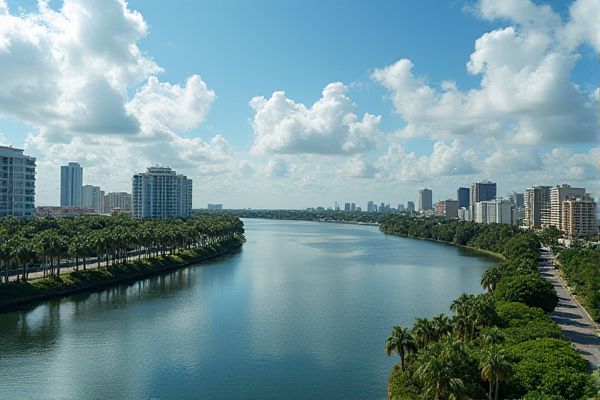
What to know as new resident in Florida: State's diverse climate and weather. Hurricane preparedness essentials. Cost of living and housing market. Wildlife awareness and safety measures. Local transportation and traffic conditions. Florida's tax-free income policy. Popular recreational activities and attractions. Natural disaster insurance options. Water quality and conservation tips. Community and cultural diversity dynamics.
State's diverse climate and weather.
Florida has a diverse climate characterized by subtropical to tropical conditions, with distinct wet and dry seasons, high humidity, frequent thunderstorms, and the potential for hurricanes, especially from June to November. The state's climate varies from tropical in the south to subtropical in the north, with significant influences from the Gulf of Mexico and the [Gulf Stream](https://www.floridasmart.com/science-nature/weather).
Hurricane preparedness essentials.
As a new resident in Florida, it is crucial to understand hurricane season, which spans from June 1 to November 30. Preparation includes creating an emergency kit with non-perishable food, water, first-aid supplies, and important documents. Developing a communication and evacuation plan is essential, as is securing your home with storm shutters and trimmed trees. Be sure to stay informed through local news and emergency alerts. Additionally, it is wise to review your insurance coverage, fill up your car's gas tank, and charge electronic devices. Preparing for potential power outages and property damage is equally important. For comprehensive guidance, refer to the Hurricane Preparedness 101 Guide to ensure you and your family are ready for hurricane season in Florida.
Cost of living and housing market.
As a new resident in Florida, you should know that the average annual cost of living is around $50,689 per person, with housing being a significant expense, where the average home value is $399,807 and rental prices vary widely by city. Utility costs average around $400 per month, and Florida has one of the lowest overall tax burdens, with no state income tax but a 6% state sales tax plus local taxes. For more comprehensive information on financial matters, consider visiting Unbiased, where you can delve deeper into the costs associated with living in this vibrant state.
Wildlife awareness and safety measures.
As a new resident in Florida, ensuring wildlife awareness and safety is paramount. It is crucial to keep pets on short leashes and avoid storing food or scented items in unsecured areas to prevent attracting wildlife. Additionally, one should never feed wildlife and inspect their residence for potential wildlife entry points to maintain safety. Moreover, maintaining a safe distance from wild animals is essential to prevent negative encounters and protect both humans and wildlife. For more detailed guidance and comprehensive Wildlife Tips for Visitors, visit the Florida Fish and Wildlife Conservation Commission.
Local transportation and traffic conditions.
As a new Florida resident, you can use the Florida 511 system to get real-time traffic information on interstates, toll roads, and major metropolitan roadways, including updates on crashes, congestion, construction, and travel times. This information is accessible through a toll-free call, the FL511.com website, the Florida 511 mobile app, or Twitter feeds.
Florida's tax-free income policy.
Florida does not have a personal income tax, meaning residents do not pay state or local taxes on their income, including pensions, 401(k)s, IRAs, Social Security benefits, and investment income. This makes Florida highly attractive for retirees and individuals looking to minimize their tax burden. For more detailed information, visit the State Taxes Guide provided by AARP, which elaborates on the financial benefits of living in the Sunshine State.
Popular recreational activities and attractions.
Florida offers a diverse range of recreational activities and attractions, including beaches, theme parks like those in Orlando, outdoor activities such as kayaking and hiking in state parks, and unique experiences like bioluminescence paddling in Cocoa Beach and exploring the Everglades. The state is also rich in historical and cultural attractions, such as St. Augustine, Amelia Island, and the vibrant cities of Miami and West Palm Beach.
Natural disaster insurance options.
As a new resident in Florida, it's crucial to understand that Natural Disaster Insurance is not a single, all-encompassing policy, but rather distinct policies for specific disasters such as floods, earthquakes, hurricanes, and sinkholes, which are typically added to standard property insurance policies. For detailed information on the different types of disaster coverage available, the Florida Insurance website provides invaluable insights. Each type of disaster insurance covers unique types of damage and cannot be interchanged, so understanding the specifics can be vital to ensuring adequate protection for your property.
Water quality and conservation tips.
To conserve water in Florida, residents can take actions such as installing low-flow fixtures, turning off faucets while scrubbing or brushing teeth, taking shorter showers, and checking for leaks. Outdoors, they can water lawns and plants only when necessary, use nozzles on garden hoses, and follow the Florida-Friendly Landscaping guidelines.
Community and cultural diversity dynamics.
As a new resident in Florida, it is crucial to understand the state's rich cultural diversity, with significant populations of Hispanic or Latino, African American, Asian, and Native American communities, as well as a strong LGBTQ+ presence. Embracing this diversity involves acknowledging and appreciating different cultures, creating inclusive community spaces, and addressing discrimination to build vibrant and welcoming communities. To delve deeper into how these elements are interwoven within the local tapestry, the Importance of Diversity and Inclusion in Florida Communities provides valuable insights. This engagement not only strengthens communal bonds but also contributes significantly to the socio-economic growth and harmony within the state.
